Related Research Articles
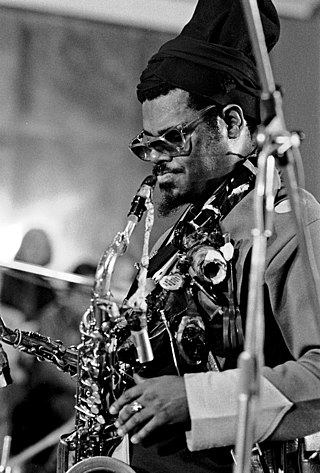
Rahsaan Roland Kirk, known earlier in his career simply as Roland Kirk, was an American jazz multi-instrumentalist who played tenor saxophone, flute, and many other instruments. He was renowned for his onstage vitality, during which virtuoso improvisation was accompanied by comic banter, political ranting, and the ability to play several instruments simultaneously.

John Barry Prendergast was an English composer and conductor of film music. Born in York, Barry spent his early years working in cinemas owned by his father. During his national service with the British Army in Cyprus, Barry began performing as a musician after learning to play the trumpet. Upon completing his national service, he formed a band in 1957, the John Barry Seven. He later developed an interest in composing and arranging music, making his début for television in 1958. He came to the notice of the makers of the first James Bond film Dr. No, who were dissatisfied with a theme for James Bond given to them by Monty Norman. Noel Rogers, the head of music at United Artists, approached Barry. This started a successful association between Barry and the Bond series that lasted for 25 years.
Harold McNair was a Jamaican-born saxophonist and flautist.

Soft Machine are a British rock band from Canterbury formed in mid-1966 by Mike Ratledge, Robert Wyatt, Kevin Ayers, Daevid Allen and Larry Nowlin. As a central band of the Canterbury scene, the group became one of the first British psychedelic acts and later moved into progressive and jazz rock, becoming a purely instrumental band in 1971. The band has undergone many line-up changes, with musicians such as Andy Summers, Hugh Hopper, Elton Dean, John Marshall, Karl Jenkins, Roy Babbington and Allan Holdsworth being members during the band's history. The current line-up consists of John Etheridge, Theo Travis, Fred Thelonious Baker and Asaf Sirkis.

Samuel Carthorne Rivers was an American jazz musician and composer. Though most famously a tenor saxophonist, he also performed on soprano saxophone, bass clarinet, flute, harmonica, piano and viola.
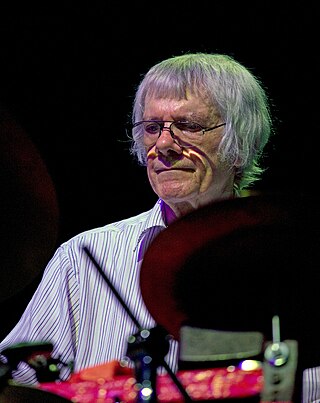
Tony Oxley was an English free improvising drummer and electronic musician.

Brian Albert Gordon Auger is an English jazz rock and rock music keyboardist who specialises in the Hammond organ.

Vinegar Joe were an English Blues rock band, formed in 1971 in London. They released three albums on Island Records, but were best known for their live shows and launching the solo careers of Elkie Brooks and Robert Palmer.
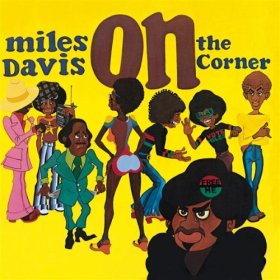
On the Corner is a studio album by the American jazz trumpeter, bandleader, and composer Miles Davis. It was recorded in June and July 1972 and released on October 11 of that year by Columbia Records. The album continued Davis' exploration of jazz fusion, and explicitly drew on the influence of funk musicians Sly Stone and James Brown, the experimental music of Karlheinz Stockhausen, the free jazz of Ornette Coleman, and the work of collaborator Paul Buckmaster.
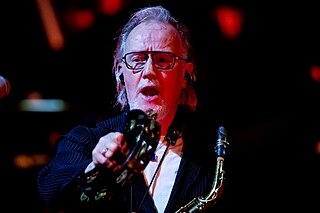
John Anthony Helliwell is an English musician, best known as the saxophonist, secondary keyboardist, and backing vocalist for the rock band Supertramp. He also served as an MC during the band's concerts, talking and making jokes to the audience between songs.
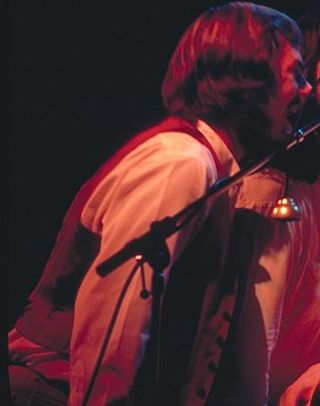
Douglas 'Dougie' Campbell Thomson is a Scottish musician, born in Glasgow and raised in the Rutherglen area of the city. He was the bass guitarist of progressive rock band Supertramp during much of the Seventies and Eighties.

Roy Babbington is an English rock and jazz bassist. He became well known for being a member of the Canterbury scene progressive rock band Soft Machine.

Chick Corea (1941–2021) was an American jazz pianist and composer born on June 12, 1941, in Chelsea, Massachusetts. Corea started learning piano at age four. He recorded his first album, Tones for Joan's Bones, in 1966. Corea performed with Blue Mitchell, Willie Bobo, Cal Tjader and Herbie Mann in the mid-1960s. In the late 1960s he performed with Stan Getz and Miles Davis. The National Endowment for the Arts states, "He ranked with Herbie Hancock and Keith Jarrett as one of the leading piano stylists to emerge after Bill Evans and McCoy Tyner, and he composed such notable jazz standards as 'Spain', 'La Fiesta', and 'Windows'."
Michael "Jimmy" James was a Jamaican-British soul singer, known for songs like "Come to Me Softly", "Now Is the Time" and "I'll Go Where Your Music Takes Me". Based in Britain, he performed as the lead singer of Jimmy James and the Vagabonds from the mid-1960s.
Clive Chaman is a UK-based bass guitarist and session musician, born in Trinidad and Tobago.
The John Barry Seven was a band formed by John Barry in 1957, after he abandoned his original career path of arranging for big bands.
A Band Called O was a band from Jersey, Channel Islands. Originally known as The Parlour Band, playing progressive rock, they renamed to A Band Called O for two albums on CBS/Epic and later to The O Band for further albums with UA. Despite issuing five albums, on three major labels, and being championed by John Peel, for whom they recorded four Peel Sessions, they had no chart success; but were a popular live act, who toured Britain and Europe.
The Alan Bown Set, later known as The Alan Bown! or just Alan Bown, were a British band of the 1960s and 1970s whose music evolved from jazz and blues through soul and rhythm and blues and ended up as psychedelia and progressive rock. The band achieved limited chart success and is best known for the role it played in developing the careers of numerous musicians including Mel Collins, John Helliwell, Robert Palmer, Jess Roden and Dougie Thomson.
Starry Eyed and Laughing were an English rock band of the 1970s. Formed in 1973, they released two albums on CBS, recorded three Peel Sessions and undertook a US tour, before briefly evolving into Starry Eyed, and finally disbanding in 1976.
Jeff Bannister is a keyboardist and singer. He started in early 1960s rock and roll groups, and was a member of The John Barry Seven in their later years. He then joined the groups spinoff, The Alan Bown Set.
References
- ↑ "The Alan Bown Set Songs, Albums, Reviews, Bio ..." AllMusic. Retrieved 2024-08-10.
- ↑ Lees, Nigel (2007). Shapes and Sounds Volume 2, Shades of Deepest Purple from the BBC Archives 1967–1971. Top Sounds Records.
- ↑ "The John Barry Seven Songs, Albums, Reviews, B..." AllMusic. Retrieved 2024-08-10.
- 1 2 "The Alan Bown (Set)". www.alexgitlin.com. Retrieved 2024-08-10.
- ↑ Listen - Alan Bown | Album | AllMusic , retrieved 2024-08-10
- 1 2 Joynson, Vernon (2008). The Tapestry of Delights Revisited. Borderline Productions. pp. 114–115. ISBN 978-1-899855-15-5.
- ↑ jbrkive (2013-06-11). THE ALAN BOWN! TOTP VIDEO 1968 . Retrieved 2024-08-10– via YouTube.
- ↑ "JONESY". Progarchives.com. Retrieved 2024-08-10.
- ↑ Webmaster. "Music by John Barry - The Alan Bown Set Before and Beyond". johnbarry.org.uk. Retrieved 2024-09-05.
- ↑ "Alan Bown, R.I.P." DMME.net. Retrieved 2024-08-10.
- ↑ "Alan Bown Obituary (2014) - Legacy Remembers". Legacy.com. Retrieved 2024-08-10.